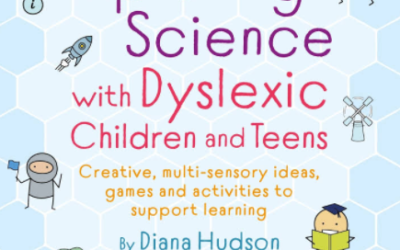When interviewing accomplished people of all sorts who are also dyslexic, there are some recurring themes – and one is, “I learned how to do the ‘dyslexic thing,’ you know, overprepare.” In some cases that means committing more hours to something – whether it was oral presentation or final project or job rotation. But often, it’s not just extra time spent; it’s also learning how to streamline certain repetitive features along the lines of “plan better” and not just “work more.” I was recently reminded of this when a social worker posted her work hacks for school and for work. One example is creating a template for her case notes: The template streamlines repetitive information that needs to be covered and reduces […]
College Success: Strategies
"One half of all students who begin college fail to complete their degrees, resulting in wasted talents, time, and resources... Educating students on learning skills only solves part of the problem for students at risk for dropping out of college. According to this...
Math Strategies Without Anxiety with Stanford Prof Jo Boaler
If you anticipate working with a student on math this coming year, what approach will you take? Dr. Jo Boaler has tips that can help create a positive atmosphere for learning. https://vimeo.com/163871454 To read the entire handout...
Learning Irregular Words: Activities and Games [Premium]
Irregular words don’t fit the standard sounding out convention, but because they can occur commonly in text, they need additional practice to be recognized quickly. How do you help students practice, but not be guilty of “drill and kill”? Rote memorization is also difficult for many dyslexic students so that not only is repetition inefficient, it often introduces unwanted errors. Having a toolkit of games and various activities to change up the learning practice can make the session fly by and you may be surprised how much better the information is remembered later. In the videos below, check out low tech ways to change things up and make practice more fun and less drudgery. Because there are so many spelling […]
The Strength Switch [Premium]
Lea Waters is a psychologist and author from Australia who has developed a helpful strategy to reframe and help common childhood challenges. She suggests 5 Questions to overcome a natural tendency to be negative. Here are the 5 questions. 1. Is It Strength Overuse? 2. Is It Strength Underuse? 3. Is it the Flipside of a Strength? 4. Could It Be a Blocked Strength? 5. Could It Be Forced Overuse of a Weakness or a Learned Behavior? #1. Is It Strength Overuse? Lea gives the example of her husband’s playfulness and humor. He could make his classmates laugh, but his playfulness and humor could also get him in trouble with teachers and other authority figures. From Lea: “A strength-based parent taking a child […]
Music And Dyslexia: Chat with Sally Daunt, Chair of the Music Committee of the BDA [Premium]
Recently, I had a wonderful opportunity to chat with Sally Daunt, Chairwoman of the Music Committee of the British Dyslexia Association. We had been corresponding about dyslexia and choral groups and Sally had asked about how dyslexic strengths can manifest themselves in choral groups where singers had to fit into tightly controlled schedules of music, extensive sight reading, and music performances which could have limited opportunities for musical interpretation. From my discussion with Sally: “Many dyslexic musicians have difficulty with sight reading – and perhaps cathedral choirs might consider whether an absolute requirement is necessary in the audition process. Some who have difficulty with sight reading might be able to pick music up quite quickly having heard a version once. In theater companies, […]
Mind Wandering, Reading, and Dyslexia
"My mind is very visual: I can see anything in pictures, and I always visualize things. I can’t help it. It’s how I’m wired. So whatever you talk about, I’ll see pictures in my head. Very vivid, colorful, lifelike pictures. They aren’t still pictures. I can make them...
Dyslexic Talents in STEM: Chemistry [Premium]
“Through most of high school, I hated math and science. It wasn’t until my senior year when I took AP statistics and AP chemistry that I discovered that I enjoyed solving challenging analytical problems. After I graduate in May, I plan to pursue a graduate degree in Electrical Engineering.” – Leah Harper Although chemistry may present dyslexic students with challenges, once the initial difficulty of notation and the periodic chart are mastered, the spatial and analytical aspects of chemistry can become life-long endeavors. In a video (that’s now unavailable on YouTube), Dr. Blake Charlton talked about how he discovered the narrative intelligence associated with dyslexia and how he used it to help him learn the periodic chart. Instead of memorizing columns of elements by […]
Managing Information with Concept Maps [Premium]
Although many people may use the terms “concept map” and “mind map” interchangeably, mind maps tend to be simpler, relating information to a central topic, whereas concept maps seek to cover more complex subjects, relating different parts to each other. Concept maps can be used to simplify material because different information can be grouped together and in the making of the map it can be easier to see how new knowledge builds on old. The process of making a concept map also transforms learning into an active process and students who are strong personal and experiential learners may remember the process better than reading through notes again and again. For students who say that they get lost in class, doing a concept map can help […]
Exploring Science With Dyslexic Children & Teens
"The book begins by describing the strengths and weaknesses of creative thinkers who have dyslexia. It outlines the reasons that they may struggle in science and gives examples of specific areas of the school science curriculum that are often very challenging for...
Starting from the Positive Side of Dyslexia [Premium]
Last week I had a chance to talk with Aillie McKeever of the Schwab Learning Center at Stanford. In 2019, before COVID pandemic had fully taken hold here in the US, Stanford’s Schwab Center had decided to prioritize strengths in their approach to each and every student. They announced a “paradigm shift” to a strength’s based model of education. Every student would have a folder with a strengths section included in their assessment. Neurolearning shared its MIND Strengths Questionnaire with the center to examine the impact on students there. From Aillie: “In 2019, the MIND Strengths questions were included in this interview for every new student. Doing this seems to amplify students’ recognition of their strengths. As Learning Specialists leading the interviews, we noticed that […]
The Double Whammy: Dyscalculia and Dysgraphia [Premium]
What happens when a student has both dyscalculia and dysgraphia? Be prepared for an educational path that has a timing of its own. Dysgraphia often accompanies dyslexia, but dyscalculia too. If you or your student has two or three out of these 3 “d’s” be prepared for a challenging course and a need for individualization for many years. The most typical presentation for dyscalculia relates to students who have trouble mastering the sequence of numbers and recall of basic math facts. When dysgraphia gets added to the mix, you can imagine how it may swamp working memory, causing students to lose track when they work through math problems. In a very real sense having both dyscalculia and dysgraphia also robs students of being able to […]

![Preparing with Templates and Posters [Premium]](https://www.dyslexicadvantage.org/wp-content/uploads/2021/08/Templates-2-400x250.jpg)


![Learning Irregular Words: Activities and Games [Premium]](https://www.dyslexicadvantage.org/wp-content/uploads/2021/08/Irregular-Words-e1628449891961-400x250.jpg)
![The Strength Switch [Premium]](https://www.dyslexicadvantage.org/wp-content/uploads/2021/08/strength-switch-4-400x250.jpg)
![Music And Dyslexia: Chat with Sally Daunt, Chair of the Music Committee of the BDA [Premium]](https://www.dyslexicadvantage.org/wp-content/uploads/2021/07/Music-400x250.jpg)

![Dyslexic Talents in STEM: Chemistry [Premium]](https://www.dyslexicadvantage.org/wp-content/uploads/2021/07/Chemistry-3-400x250.png)
![Managing Information with Concept Maps [Premium]](https://www.dyslexicadvantage.org/wp-content/uploads/2021/07/Concept-Map-400x250.jpg)

![Starting from the Positive Side of Dyslexia [Premium]](https://www.dyslexicadvantage.org/wp-content/uploads/2021/06/Starting-From-The-Positive-Side-Of-Dyslexia-400x250.png)
![The Double Whammy: Dyscalculia and Dysgraphia [Premium]](https://www.dyslexicadvantage.org/wp-content/uploads/2021/06/Dysgraphia-and-Dyscalculia-400x250.png)













